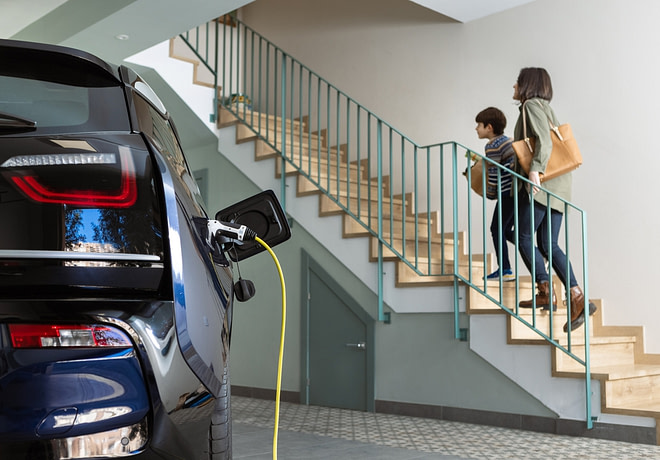There’s a bit to consider when choosing to go electric. After shortlisting the cars you like, there’s the installation fee for your charger to consider. Then you’ll have ongoing home charge costs. With rising electricity prices in the news for months and different tariffs for peak and off-peak use, calculating the cost of home charging cars starts to get tricky.
It doesn’t end there though – some EVs are more expensive to charge than others. And not all home EV chargers are created equal. So it matters which EV and charger you choose to make your own.
The total cost of running your electric car is typically going to include three expenses. The initial installation cost of the home charger should be a one-off cost. Then, you have the cost of electricity for plugging your car in at home. Even if you usually stick with home charging, there will be times you need to use a public charger.
So at the end of the day, the cost of charging your EV is a combination of your home charger installation, the price you pay for energy per kilowatt at home, and the cost of public chargers. We’ve broken it down so you can get to grips with the real cost of home charging cars.
Installing a home charger for your EV
Although the Electric Vehicle Homecharge Scheme ended on April 1st this year, you can still get a grant for a home charger. The new EV chargepoint grant helps with the cost of installation.
In a nutshell, the government will cover up to 75% of the installation cost of a smart charge point at your home. There are slightly different guidelines for homeowners, renters, landlords and people living in flats or using resident car parks.
It’s worth checking out the guidance on the grants before you buy an EV. Along with making a shortlist of the EVs you’d like to own, consider the different chargers too. Currently, there’s no standardisation of EV chargers. Different home chargers fit different cars. It’s helpful to know which home chargers will fit the car you buy.
Generally speaking, installing a charge point at your property will set you back somewhere in the region of £900. With the full government grant, that’s around £225 out of your pocket.
The cost of electricity for home charging cars
Once you have your home charger installed, it’s onto electricity costs. With rising prices all over the news for months, it’s reasonable to be concerned about this. Home charging is supposed to be cheaper than petrol, right?
The good news is, that even with rising energy prices and slowly declining petrol prices, it is still cheaper, per mile, to charge a car than fill the tank with petrol or diesel. Even if you’re charging your car from a public charging point.
The government have recently arranged to cap energy bills. Full details of the cost per kilowatt are in their factsheet. There are different measures for different tariffs, and how much you pay for electricity is impacted by where you live too.
It’s best to check your electricity supplier’s tariffs to figure out your exact costs of home charging cars and running your home.
The short story is that the cost of electricity for people on a standard variable tariff has been capped at 34.0p per kilowatt. If you’re on a fixed tariff, energy prices will be reduced by 17p per kilowatt by the 1st of October.
That means the average home in London on a fixed rate tariff will pay around 55.33p per kilowatt. Those with an economy-7 metre will pay around 58.17p p/kWh in peak times and 34.86p p/kWh off-peak.
Finding out your cost for home charging
To figure out how much it will cost you for home charging cars, you’ll need to know the charge speed of your home charger (in kilowatts), the length of time needed to fully charge your car, and the price you’re paying per kilowatt for electricity.
Home chargers vary in wattage, we’ll use a 3.7kW charger in our example. The average electric car needs around 8 hours to get a full charge from a standard home charger. Although, the time it takes to charge a car varies too. Let’s take the standard variable tariff of 34p p/kW for electricity.
Convert the kilowatts into watts for starters. In our example, that’s 3.7 multiplied by 1,000 = 3,700 watts.
Next, multiply those watts by the amount of time it takes to give your car a full charge. That’s 3,700 watts multiplied by 8 hours = 29,600. Turn that back into kilowatts by dividing it by 1,000. You’ll end up with 29.6kW.
Finally, multiply that 29.6kW by the cost of your electricity — 29.6kW x 0.34p = £10.06 per full charge.
Home charging vs public chargers
Public chargers are a different story from home chargers. Generally, they cost more than a home charger. Public EV chargers have increased in price this year so the average cost per kilowatt is now around 44.55p.
Even if you regularly charge at home, you’ll need the public charging network for a UK road trip or holiday.
On top of the price per kilowatt, you’ll need to pay a yearly subscription or a one-off charge to use public chargers. If you do pay a subscription to use a charging network like Pod Point, you’ll still be able to use other chargers across the UK when needed.
Of course, with public chargers, you have the choice of standard charge times, rapid chargers and ultra-rapid charging. The faster the charge, the more pricey it is. More often than not chargers are the fast kind for people on the go. Remember, regularly using rapid chargers depletes the life of your battery.
Using a standard charger most of the time will extend the life of your EV battery and help you avoid an EV nightmare.
Running an EV vs traditional cars
Even at £10 per full charge, charging an electric car compares favourably to the price of petrol or diesel.
The average EV costs around 10p per mile using a rapid charger. If you are home charging, that’s more like 3p per mile for a car that has a 280-mile range. A similar sized petrol car will cost you around 20.1p, per mile. That’s double the cost of a rapid charge and almost seven times the cost of home charging.
The cost of home charging has definitely gone up with the rising cost of electricity. But even with petrol prices easing a little, it’s cheaper to run an EV. Home charging ends up being about half the cost of running a car on petrol or diesel – even after you’ve installed a charger.









Related articles